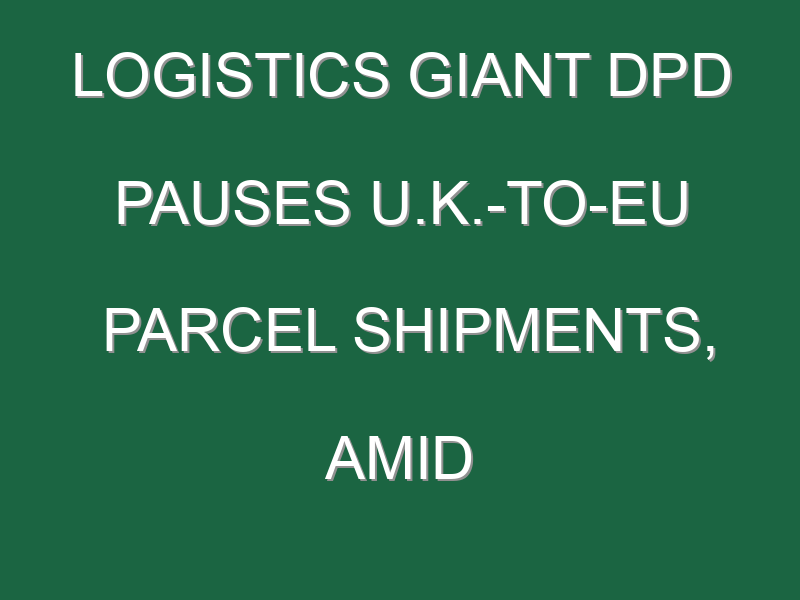Our mission to make business better is fueled by readers like you. To enjoy unlimited access to our journalism, subscribe today.
The U.K. and European Union’s last-minute post-Brexit trade agreement may have warded off the threat of tariffs for many goods crossing their newly-significant border, but chaos has arrived nonetheless.
On Friday, Europe’s largest parcel delivery network suspended its road service from the U.K. into Europe—including the Republic of Ireland, which has the EU’s only land border with the U.K. DPDgroup said the move was largely down to the new paperwork that is required to send British parcels into the EU.
“The EU-U.K. Trade and Cooperation Agreement resulted in more complex processes, and additional customs data requirements for parcels destined for Europe. This, along with delays and congestion at U.K. ports for channel crossings, has placed extra pressure on our turnaround and transit times,” the company, which is owned by France’s La Poste and recently built Europe’s largest parcel hub in the U.K., said in an emailed statement.
“We are seeing up to 20% of parcels with incorrect or incomplete data attached, resulting in these parcels needing to be returned to customers, so that the required data can be provided. In view of this unprecedented set of circumstances we believe that it is only right to pause and review our road service into Europe, including the Republic of Ireland.”
DPDgroup said it intends to resume the service on Wednesday, Jan. 13, after working with its customers to “validate and correct the data we have in our system.”
Last-minute deal
Other logistics firms are also reporting big problems with the red tape introduced by the trade agreement that was signed on Dec. 30, less than two days before it came into effect at the end of the Brexit transition period.
Part of the problem is the newly-introduced need to send mail with customs declarations, where before none would have been required.
Irish customs authorities on Thursday night announced a temporary easing of customs requirements for goods arriving on ferries from Britain, to get freight moving again. Meanwhile, U.K. hauliers have been told to expect tougher customs controls when entering France, as of Monday.
But new rules-of-origin requirements provide a potentially more serious hurdle for businesses.
Under the terms of the trade deal, goods crossing the border incur no tariffs or duties as long as they originate within the EU or the U.K.—if they don’t, they may be subject to World Trade Organization-standardized tariffs.
Rules of origin
This is all relatively easy to figure out when products are wholly made in the U.K. or the EU, but it becomes far more complicated when some components come from outside this free-trade area. At that point, companies have to turn to the deal’s tariff custom code, which sets out requirements on a product-by-product basis.
Dairy products, for example, incur a tariff if more than 20% of their weight comes from outside the area; for white chocolate, the limit is 40%. Also: the transformation of external ingredients into a U.K. or EU food product may or may not make the product tariff-free, depending on how the food is made.
And on top of that, the trade deal does not allow for mutual recognition of product conformity standards, giving border officials something extra to check.
“This makes unravelling the genome sequence look simple,” said Marks & Spencer chair Archie Norman on Thursday. M&S is among a large group of British retailers that are scouring their catalogs for potential problems and begging the EU and the British government to enable more tariff-free trade.
The British department-store chain Debenhams last week shuttered its Irish e-commerce operation, so as to avoid tariffs. John Lewis, one of its biggest rivals, has also temporarily stopped serving EU customers.
More must-read retail coverage from Fortune:
- 14 of the biggest bankruptcies of 2020—and who might be next in 2021
- The pandemic cramped Rent the Runway’s style—but here’s how the company is fashioning a comeback in 2021
- From pet adoptions to D.I.Y. home improvement to sweatpants: 10 COVID-fueled consumer trends that will endure
- Macy’s is closing 45 stores in big wave of its turnaround plan
- A record 12,200 U.S. stores closed in 2020 as e-commerce, pandemic changed retail forever




